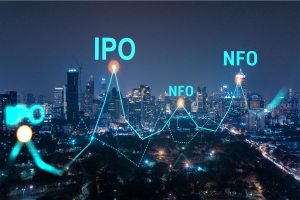You must have come across a lot of things in life that look the same but aren’t. Let’s take tea and coffee, for instance. They almost have the same colour, consistency, use, preparation method, etc. Yet, you know that they are different. Likewise, an IPO and an NFO also may seem akin, but they aren’t. They do have some similarities but are principally as distinctive as tea and coffee. Let’s find out more.
IPO and NFO: What do they mean?
Initial Public Offering (IPO) and New Fund Offer (NFO) are types of investments that can offer you an opportunity to create wealth.
When a private company offers its stocks to the public for the very first time, it does it through the launch of an IPO. An NFO is similar but with one exception. NFOs are launched by Asset Management Companies (AMCs) when they offer the units of an upcoming mutual fund scheme for subscription for the first time.
So, conclusion? They can both be called first-timers, and you can think of them as some sort of launch party that invites investors!
IPO vs NFO – Points of difference covered
- Ever wondered what makes companies launch IPOs and NFOs?
- Want to invest your money in IPOs and NFOs?
- Do you think IPOs and NFOs are priced similarly?
IPOs are launched to raise equity capital that can be used for managing debt, business expansion, research, and more. IPOs also give credibility to the company as it gets more exposure in the stock market.
You can expect a similar reason for NFOs but with a slight difference. NFOs are also launched to raise capital, but their primary objective is to attract investors. Each NFO has a theme. For instance, some NFOs may invest in only a particular sector. Some NFOs also invest in only upcoming IPOs or recently listed companies.
The method of investing is not entirely different. You can invest in an IPO through a broker, bank branch, or distributor. You can then apply for the IPOs by entering your Demat account details, personal details, number of shares, total investment value, etc. Once your shares are allotted, you can manage them directly through your trading and Demat account like how you do when you invest in stocks.
You can invest in an NFO in a similar fashion through a broker or contact the AMC directly. Once your units are allotted, you can choose to continue your investments through a Systematic Investment Plan (SIP) that allows you to invest regularly over time or invest lump sum funds, as per your choice.
Nope! IPOs are priced as per the company’s valuations. There is no fixed framework here.
NFOs are usually priced at Rs. 10, irrespective of whether they are being launched by a top AMC in India or a new one.
Conclusion
NFOs and IPOs are not the yin and yang of the investing world. They are merely there to offer you different uses and purposes. Having said that, it cannot be denied that IPOs require a more sophisticated understanding of the stock market. A mutual fund has a fund manager to manage your money on your behalf. But if you want to invest in IPOs even though you lack knowledge, you can invest in mutual funds that invest in IPOs. This way, you will get all the mutual funds benefits along with exposure to IPOs.
An investor education initiative by Edelweiss Mutual Fund
All Mutual Fund Investors have to go through a onetime KYC process. Investor should deal only with Registered Mutual Fund (RMF). For more info on KYC, RMF and procedure to lodge/redress any complaints, visit -https://www.edelweissmf.com/kyc-norms
MUTUAL FUND INVESTMENTS ARE SUBJECT TO MARKET RISKS, READ ALL SCHEME RELATED DOCUMENTS CAREFULLY
Trending Articles
MUTUAL FUND INVESTMENTS ARE SUBJECT TO MARKET RISKS, READ ALL SCHEME RELATED DOCUMENTS CAREFULLY.




















